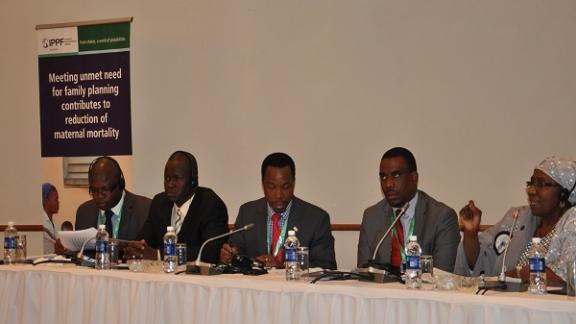1 July 2015, Lusaka, Zambia
A high-level African stakeholders meeting to dialogue on Sexual and Reproductive Health and Rights (SRHR) policies is currently underway in Lusaka, Zambia.
The meeting, taking place from 29 June – 2 July 2015 brings together Civil Society, Regional Economic Blocs and Parliamentarians from different countries across Africa. The delegates are reviewing the implementation status of various SRHR policy frameworks, including the International Conference on Population and Development (ICPD), the Maputo Plan of Action (MPoA), and the Millennium Development Goals. These frameworks were developed in response to the call for the reduction of maternal and infant morbidity and mortality, and over the years have served as a guide towards the reduction of poverty in Africa; through SRHR interventions.
Despite the existence of many progressive policy instruments at continental and regional levels, the SRHR situation on the continent still faces major challenges. Maternal Mortality Rates remain exceptionally high, humanitarian crisis are rife and adolescent and youth health concerns are yet to be fully addressed. Delegates are therefore expected to propose innovative strategies to improve SRHR policy implementation that is key in addressing the unfinished SRHR business. This meeting is timely, as lessons from the implementation of Millennium Development Goals (MDGs) and other past frameworks are being shared ahead of the launch of new 17 Sustainable Development Goals (SDGs) Post 2015.
Speaking during the opening ceremony on Tuesday 30 June, Zambia’s Deputy Health Minister Dr. Chitalu Chilufya, representing Health Minister Hon. Joseph Kasonde, acknowledged the commitment demonstrated by African countries in the promotion of good sexual and reproductive health rights through development of comprehensive policies thus far.
“Many countries have indeed adopted various SRHR policy instruments that continue to guide the sexual and reproductive health agenda in their countries. We have seen commitment by African leaders to addressing the stipulated targets in the Millennium Development Goals (MDGs), the International Conference on Population and Development (ICPD), and the Maputo Plan of Action (MPoA),” he said.
The Zambian health minister however decried the fact that the SRHR agenda has not been accorded the priority it deserves in the national agenda in many countries.
“Because of lacklustre commitment by many African governments to implementing the health agenda in their countries, many SRHR initiatives remain under-resourced and inadequately implemented. Issues of Sexual Reproductive Health and Rights remain at the periphery of our in-country development agendas, thus hampering the attainment of health goals. Arguably, this has continued to significantly stagnate Africa’s development progress,” Dr. Chilufya said.
The Minister further urged African leaders to prioritize unmet SRHR targets and identify workable strategies as well as formidable areas of collaboration that will realize improved implementation of SRHR goals for the continent.
The meeting convened by IPPF Africa Region has over 40 delegates participating and these include senior technocrats from the Africa Union Commission (AUC), East African Community (EAC), Intergovernmental Authority on Development (IGAD), Common Market for Eastern and Southern Africa (COMESA), Economic Community of Central African States (CEEAC), Forum of Parliaments of International Conference in the Great Lakes Region (FP-ICGLR) Pan- African Parliament (PAP), Members of Parliament from Uganda, Zambia and Cape Verde, Republic of South Africa Officials, West African Health Organization (WAHO), East Central and Southern Africa – Health Community (ECSA-HC), UNFPA, policy and economic experts, ,youth and women leaders, selected country experts as well as SRHR coalitions (RHANA) and relevant Civil Society Organizations (CSOs).
“IPPF Africa Region, together with its 42 national Member Associations and affiliate partners in the civil society is keen on contributing to actions aimed at improving the implementation of SRHR policies in Africa. It is our belief that doing so will not only greatly reduce the high rates of maternal mortality and sexual gender based violence, but assure that every young and old African lives a quality life,” said the IPPFAR Regional Director Mr. Lucien Kouakou, who is represented at the forum by Ms. Caroline Kwamboka – the IPPFAR Senior Manager, External Relations and Advocacy.
Mr. Sam Ntelamo, the Resident Representative, IPPFAR Liaison Office to the AU reiterated the call for collaborative efforts by all stakeholders in both the private and public sectors in addressing the development challenges faced by Africa.
“Lack of resources is always an acute issue impeding the implementation of population and development agendas in developing countries. For example, the global resource target set at ICPD is far from being met –now that we are going into the post-2015 era. We firmly believe that global sustainable development requires the collective efforts of countries,” he said.
Mr. Ntelamo further urged national governments, regional and international partners to enhance their commitment to various policy instruments, honor their pledges –especially those made at the ICPD, increase funding for population, family planning and reproductive health programmes in order to promote global sustainable development in Africa.
Hon. Sylvia Ssinabulya, MP for Mityana district in Uganda emphasized the important roles of regional integration and regional economic blocs in mobilizing financial resources, even as African countries explore new financing options.
“There is no doubt that regional integration can lead to our economic growth. Unfortunately, this potential has not been sufficiently harnessed and efforts so far have not been inclusive. They have not trickled down to improve SRHR indicators. Learning from this, we need to take advantage of regional economic bloc, as well as lay more emphasis on people-centered and inclusive development,” she said.
Delegates at the meeting are expected to propose new financing for development options that African countries can explore, including domestic resource mobilization. This, in light of the noted constraints that prevent many African countries from attaining the ICPD, MPoA, MDGs and other health development goals, among them the chronic shortage of funds from both national budgets and donor countries.
when
country
Zambia
region
Africa
Related Member Association
Planned Parenthood Association of Zambia









